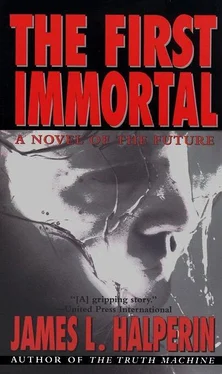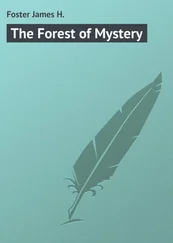Ben felt himself rising once again; to the ceiling, into the tunnel, and on into the light. The light. The Light! The promising, the beckoning, the all-encompassing, beautiful Light.
June 16,1988
It was almost twelve-thirty P.M. Gary Franklin Smith knew he should get a move on, but he continued to sit at his father’s desk in the office of the Chestnut Street brownstone poring over documents he’d found in a file folder marked “Cryonics.” He’d started at 6:45 that morning and still didn’t know what to feel or think. That was when a photograph of Benjamin Franklin, his own family’s namesake, caught his eye, so he began to read:
The nineteenth century Russian philosopher Nikolai Fyodorov once proposed that the powers of science could solve every problem of humankind, including death. In fact he dreamed that technology would eventually restore life to every person who had ever died. Since all things are composed of atoms, he believed the motions of those atoms must be predictable, if not by the science of his day then certainly by the science of the future. History would become known, and thus could be perfectly reconstructed.
Fyodorov’s assertion seems naive today. His vision of limitless technology nurtured his hope for eternal life. Or was it the other way around? Certainly human desire for resurrection transcends science; religion is itself a testament to our quest to live forever. Like a devoutly religious adherent, Fyodorov, who died in 1903, must have found comfort in the prospect of someday being raised from the dead.
But nature’s laws grant no exceptions. In 1927, Werner Heisenberg illustrated that the effect of observation on the trajectories of subatomic particles can never simultaneously be measured for position and velocity. To all appearances Heisenberg’s “uncertainty principle” forever put Fyodorov’s fanciful thesis to rest.
Now compare Fyodorov to Benjamin Franklin, an eighteenth century man of science whose view of the world was acquired through detached observation.
“I wish (physical resurrection) were possible…” he wrote in April 1773, “for having a very ardent desire to see and observe the state of America a hundred years hence, I should prefer to an ordinary death, being immersed with a few friends in a cask of Madeira until that time, then to be recalled to life by the solar warmth of my dear country. But… in all probability, we live in a century too little advanced, and too near the infancy of science, to see such an art brought in our time to its perfection.”
Franklin also wrote: “The rapid progress true science now makes occasions my regretting sometimes that I was born too soon. It is impossible to imagine the height to which may be carried, in a thousand years, the power of man over matter. We may perhaps learn to deprive large masses of their gravity, for the sake of easy transport. Agriculture may diminish its labor and double its produce; all diseases may by sure means be prevented or cured, not excepting even that of old age, and our lives lengthened at pleasure even beyond the antediluvian standard.”
Benjamin Franklin was a realist; he embraced the tenets of immortalism, yet knew he would never live to see its realization. He took his final breath in 1790.
Had Father taken his? Gary wondered. The hands of his watch kept moving, but at that moment he didn’t care.
The rest of the siblings having arrived early for their one P.M. appointment, each had been escorted to a windowless conference room and assured that Mr. Webster would be right in.
Only Gary was a little late. “Anyone ever heard of this guy?” he asked.
All three sisters shook their heads. “Dad never mentioned him,” Rebecca said.
“According to the directory, he specializes in trusts,” Gary said.
Jan nodded. “Dad’s finances were complicated.”
Then Toby entered the room.
“What are you doing here?” Jan asked.
“Got a notice in the mail. Ben musta left me his stethoscope or something.”
Gary smiled. The three women didn’t. But before their ill-humor could spread, Webster popped through the door.
“I see everyone found the place okay,” he said. “I’m Pat Webster.”
“Toby Fiske.”
Webster shook the cardiologist’s hand and looked around at the others. “That means you must be Gary,” he said, smiling. “Then which one is Jan? Maxine? And that leaves Rebecca, our designated executrix. Terribly sorry about your father. Seemed like a great guy.”
“He was,” Max answered.
“So,” Webster said abruptly, “down to business.”
The six quickly chose chairs around the conference table, as if speed might help dispel the awkwardness they felt.
“Did our father ever talk to you about wanting to be frozen?” Jan asked.
“You’re the lawyer, right?”
Jan nodded.
“Then you know I can’t answer questions about private discussions.”
“We’re his family,” Jan argued, “not his adversaries.”
“Sometimes family members wind up choosing sides,” Webster explained. “Seen it happen a lot. Blood can’t always guarantee commitments. But when I read the will—”
“Okay. Go ahead, then.”
Webster began, “‘I, Benjamin Franklin Smith, a resident of Massachusetts, being of sound and disposing mind and memory, make, publish, and declare this to be my Last Will and Testament, and I hereby revoke any and all other wills and codicils I have made.
“‘As of the date of this Will, I am no longer married, my beloved wife Margaret Callahan Smith having passed away on September fourteenth, 1979. I have four children: Gary Franklin Smith, Rebecca Carol Smith-Crane, Maxine Lee Smith Swenson, and Janette Lois Smith. I also have five grandchildren: George Jacob Crane Jr., Sarah Smith Banks, Katherine Franklin Crane, Justin Robert Swenson, and Michael Smith Banks. Under this Will, I am providing for any of these nine children and grandchildren who survive me and any additional grandchildren born prior to my death.’”
I should’ve told him about you, Jan thought, gently touching her pregnant belly.
Webster looked around the table. “Anybody mind if I skip the boilerplate and technicals vis-à-vis payment of legal obligations and expenses, et cetera, blah blah?”
“As long as we can read it later,” Jan said.
“Of course. ‘Gifts of personal effects: I bequeath six oil paintings by Gary Franklin Smith to the Fogg Art Museum at Harvard University under the terms of an agreement attached as exhibit A.’”
“He bought six of my paintings? And never told me. Damn.”
“Back when you were struggling,” Toby said. “He didn’t want you to know. And he didn’t do it because you needed it. He figured your art would draw the notice it deserved, eventually. He just wanted to speed it along. Besides, he loved your paintings.”
Gary smiled. “Son of a gun.”
Webster continued, “‘I hereby appoint Rebecca Carol Smith-Crane as independent executrix of my estate. If for any reason Rebecca is unable to perform these duties, I appoint Maxine Lee Smith Swenson, and if Maxine is unable, I appoint Janette Lois Smith.’”
Guess he still didn’t trust Gary, Jan thought, feeling a rush of pity for her brother.
“‘The executrix shall distribute the following items of property: my intimate personal items such as jewelry, clothing, books, china and silverware, furniture and furnishings, objects of art, and automobiles and all policies of insurance on such tangible property, club memberships, and all other personal and household chattels and personal property pertinent to my residence. These items shall be distributed among my children in a manner determined by the executrix, in her absolute discretion, to be fair and equitable. Any division and distribution made by the executrix shall be binding on all.
Читать дальше












